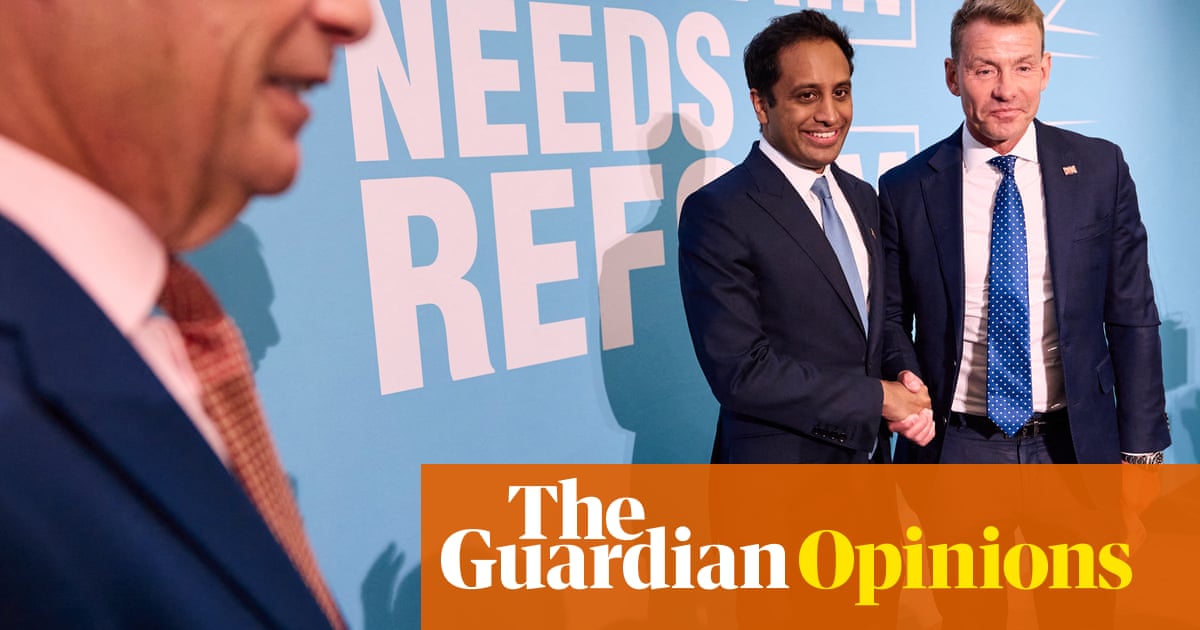It was a busy week foron-again off-againReform chair Zia Yusuf, whose job over the past 11 months had been to reform Reform. (I know.) Zia quit on Thursday. Had his job split on Friday. Returned on Saturday. Chilled on Sunday. The job split seems to have endured though, as Yusuf will now run a UK version of Doge – as we know, the perfect role for highly emotional men – while this very morning, Nigel Farage was unveiling a new chair: Dr David Bull. David brings extensive experience with witchcraft, ghosts, spirits and beasts from his time as presenter of paranormal reality TV showMost Haunted Live, where he packaged the wailings of reekingly obvious charlatan/compelling spirit medium Derek Acorah for a studio audience. I can’t imagine what this CV could do for Reform, but Nigel Farage must have seen something in it.
Derek Acorah crossed permanently to the spirit world in January 2020, but it would be nice to think that shouldn’t be a bar to his being selected as one of those Reform candidates credited with being able to make deep connections with a public that is desperately searching for something beyond the ordinary. It would certainly be a less mad development than some other of the party’s activities this week. On Monday, Farage could be found in Wales promising to reopen Port Talbot steelworks, a plan so nutso that it could only really be believed by conspiracy theorists. Jet fuelcan’t melt steel beams– and Nigel Faragecanre-melt steel furnaces that have cooled solid. Sure thing! Also, he might very well win the next election, so make of that what you will.
From theRupert Lowe conflagrationto the Yusuf hokey cokey last weekend, it has to be said that the endless drama in Reform this year hasn’t dented Farage’s party’s poll ratings one tiny bit. In fact, up they climb. My theory is that at some level, people actively like it. They liked Boris Johnson’s fecklessness and chaos too – until, admittedly, they really didn’t. Still, what a run. Asdiscussed here previously, Britain is a majority nutter nation, and in recent history our deepest and most long-lasting political affections have been reserved for figures across the spectrum who had something of the nutter to them. Thatcher, Blair, Johnson … all nutters. Even Corbyn did miles better than he should have, simply by virtue of being a nutter – though he ultimately failed for not being a kindred nutter. Reform give the impression of being long and strong in nutters. “He crawled out under the wire,” twinkled Farage this morning of Yusuf’s “bid for freedom”, “but we got him back in!”
“Sorry to put you all through that!” said Yusuf with a slightly strangulated smile. “I did realise the only way I was going to get a couple of days off was to resign and then come back again … I can’t thank Nigel enough for having me back. I regret those tweets, I was exhausted.” As Farage implied, this is just the sort of thing that happens when passionate people care almost too much.
For decades, the deepest analysis afforded to the England football side was that they needed to play with more “passion”, and there is now a huge amount of this in the way we assess politicians. Keir Starmer, a sterile lawyer who communicates with all the vim of a recorded “see it, say it, sorted” message, does not reach the parts that need reaching. Farage speaks a more natural language, and consequently gets away with dismissing with one joke a row that would have consumed other parties’ PR machines for weeks. “Reform hit a speed bump last week,” he said in Wales of Yusuf’s resignation and unresignation. “Maybe it’s because we were driving above the recommended 20mph …”
Arguably, it was ever thus. Reform keeps refreshing its moniker, but in many ways it’s still the same – like a bankrupt who changes his name each time he moves town and starts another double-glazing business. Ukip, the Brexit party, Reform – every time Nigel leads another one you hear a lot about professional revolution, but at some level they’re still the same outfit where one MEP had some altercation with another one, after whichthe latter collapsedin the European parliament. As Neil Hamilton insisted at the time, this is simply the sort of thing that happens when “passions run high”.
But by far the most important part is: it doesn’t seem to matter. What’s changed in a post-Trump world is that chaos and drama can be repolished as political assets. As I say, I think the lack of discipline is part of the appeal. Discipline – what really is there to love about that word for most people? It smacks of being told off, which many have had quite enough of over the past decade of elite cultural policing. Politicians who manage rigidly conventional discipline above almost anything else have become regarded as robotic, while prodigals like Farage are polling like they’re worth laying on a fatted takeaway for.
Instead of trying to counter Farage with the very conventions to which he is an adverse reaction, the two main parties should consider how unbelievably badly they’ve cocked things up that Nigel’s rolling drama seems like a good idea. “Can we do it?” wondered Dr David Bull rhetorically this morning of making Farage prime minister. “Well, to quote Bob the Builder: YES WE CAN.” Can’t help thinking it was someone other than Bob the Builder who made “yes we can” into an iconic political slogan … but – to use words which may function equally well as a Reform slogan – let’s not get bogged down in details.
Marina Hyde is a Guardian columnist
